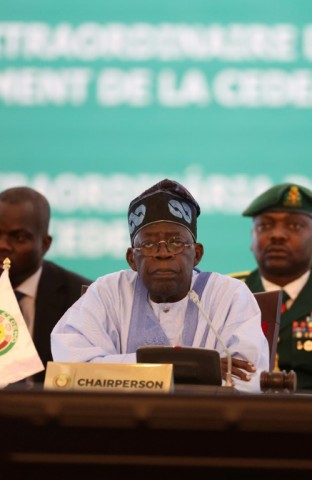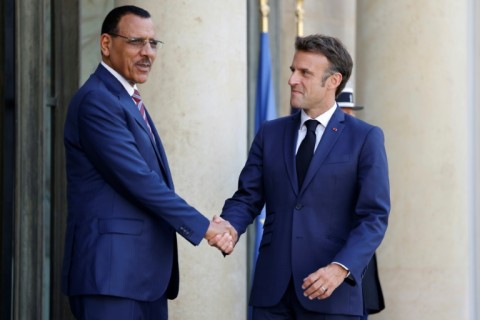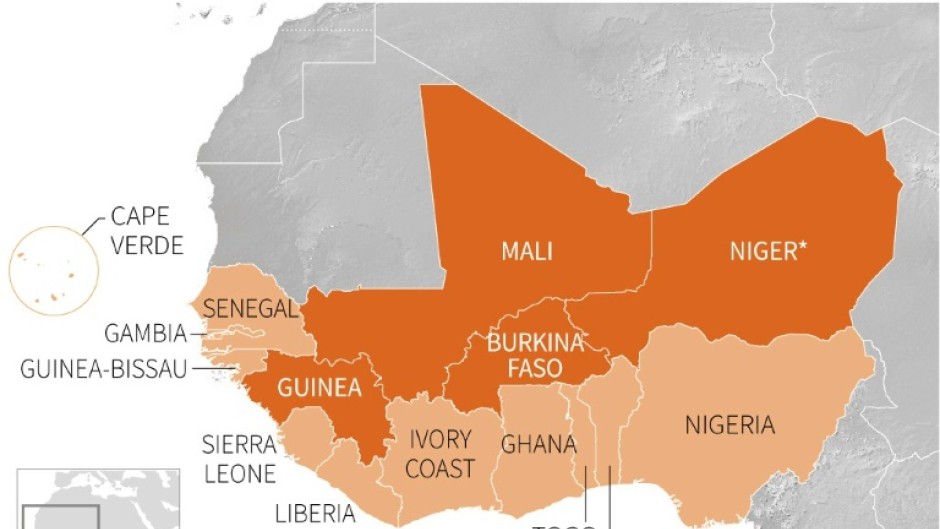PARIS - Niger's new military rulers on Wednesday accused France, the country's traditional ally, of having released captured jihadists and breaching a ban on air space on the eve of a key summit on the Sahel's latest crisis.
Leaders of the West African bloc ECOWAS are to meet in the Nigerian capital Abuja to mull their options, with diplomacy apparently edging out military intervention at present after a showdown last weekend.
Two weeks after a coup that toppled Niger's elected president, the regime accused France of having "unilaterally freed captured terrorists" -- a term for jihadists conducting a bloody eight-year-old insurgency.
The jihadists then gathered to plan an attack on "military positions in the tri-border area," a hotspot region where the frontiers of Niger, Burkina Faso and Mali converge, according to the statement issued by the coup leaders, called the National Council for the Safeguard of the Homeland (CNSP).
"Events of an extreme gravity are unfolding in Niger as a result of the behaviour of the French forces and their accomplices," it declared.
It urged the security forces to "raise their alert level across the country" and on the public "to remain mobilised and vigilant."
The regime also accused France of having flown a "military plane" from neighbouring Chad into Niger air space, defying a ban imposed on Sunday.
The two allegations were rejected by a French government official.
- Key summit -
Thursday's summit of the Economic Community of West African States (ECOWAS) takes place under the chairmanship of Nigeria, the regional superpower and advocate of a hard line against the coup.
Struggling to stem a cascade of putsches among its members, the bloc gave Niger's military rulers until last Sunday to reinstate President Mohamed Bazoum or face potential use of force.
But the coup leaders remained defiant, and the ultimatum passed without action.
On Tuesday, a bid to send a joint team of ECOWAS, UN and African Union (AU) representatives to the capital Niamey ran into the ground.
The coup leaders said they could not guarantee the mission's "safety" in the light of what they said was public anger to sanctions imposed by ECOWAS.

Despite the failure, ECOWAS and Nigeria said they would pursue all options to resolve the crisis, and the United States emphasised a "peaceful" outcome even though it too had been rebuffed.
ECOWAS said it would "continue to deploy all measures in order to restore constitutional order" in Niger.
Nigerian President Bola Tinubu said through his spokesman that "no options have been taken off of the table" but diplomacy was the "best way forward."
- 'Peaceful resolution' -
The United States sent veteran envoy Victoria Nuland to Niamey on Monday, but she came away empty-handed, being unable to meet Bazoum or even the new strongman, General Abdourahamane Tiani.
Despite this, US Secretary of State Antony Blinken said Wednesday he had spoken to Bazoum "to express our continued efforts to find a peaceful resolution" to the "current constitutional crisis".
France, which had adopted a combative tone as the ECOWAS ultimatum loomed, also signalled a softer line.
A French diplomat said it was "up to ECOWAS to take a decision, of whatever kind, on restoring constitutional order in Niger."
Bazoum, 63, was detained on July 26 by members of his presidential guard.

It is the fifth coup in Niger's history since independence from France in 1960 -- and the fourth in the ranks of the 15-nation ECOWAS since 2020.
Bazoum's election in 2021 had helped Niger to cement close ties with France and the United States, which have major bases and troop deployments in the country.
- Sahel crisis -
Countries in the fragile Sahel are battling with a jihadist insurgency that erupted in northern Mali in 2012, spread to Niger and Burkina Faso in 2015 and now is causing jitters in states on the Gulf of Guinea.
The bloody campaign has been devastating for those three countries, which have a long history of turbulence and are among the poorest nations in the world.

Since their coups, Mali and Burkina Faso have fallen out with France, the region's former colonial power and its traditional ally.
France last year withdrew its forces from those countries and refocussed its anti-jihadist strategy on Niger.
Mali and Burkina Faso have voiced solidarity with their counterparts in Niger, saying that any ECOWAS military intervention would be considered a "declaration of war" against them.

